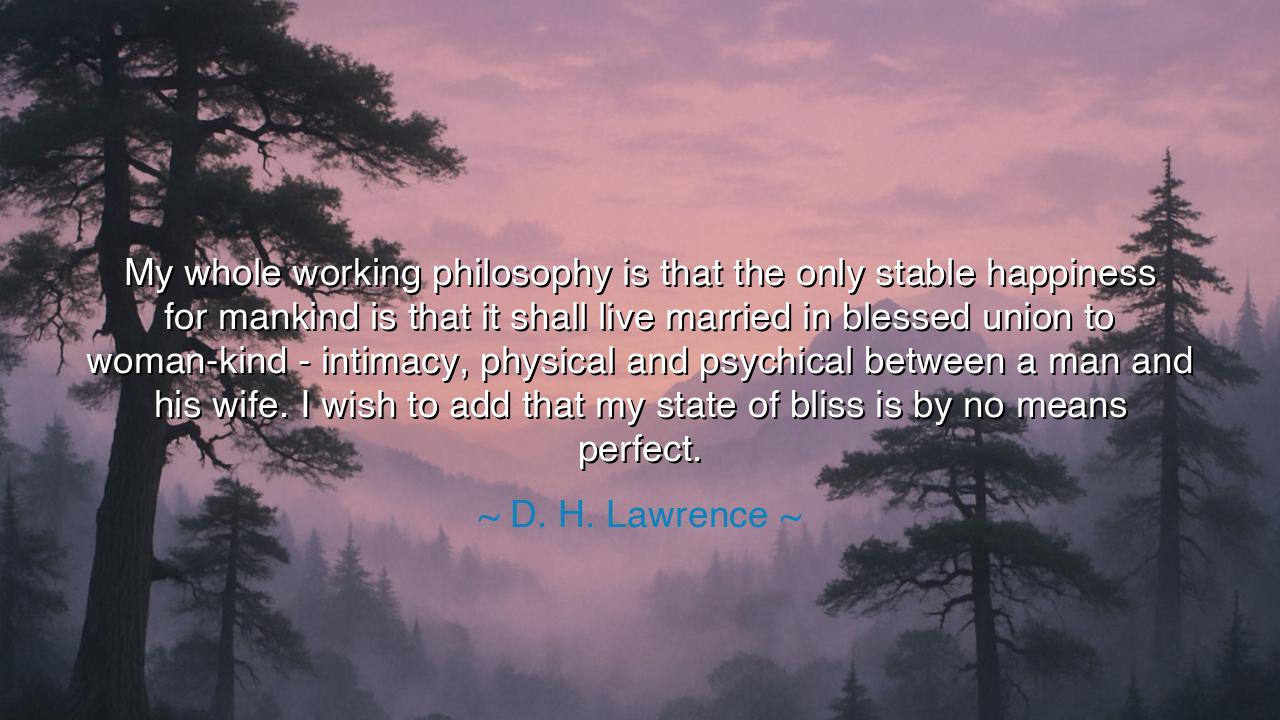
My whole working philosophy is that the only stable happiness for
My whole working philosophy is that the only stable happiness for mankind is that it shall live married in blessed union to woman-kind - intimacy, physical and psychical between a man and his wife. I wish to add that my state of bliss is by no means perfect.






In the fervent voice of D. H. Lawrence, that restless spirit who sought truth in the fire of human passion, we hear a declaration that feels both ancient and eternal: “My whole working philosophy is that the only stable happiness for mankind is that it shall live married in blessed union to woman-kind—intimacy, physical and psychical, between a man and his wife. I wish to add that my state of bliss is by no means perfect.” In these words, the great writer reveals his creed: that true happiness is born not of wealth, nor fame, nor solitary achievement, but of union—a sacred communion between man and woman, between body and soul, between the outer world and the inner flame of love.
Lawrence, ever the prophet of passion, believed that life itself is sustained by the energy that flows between the masculine and the feminine. To him, intimacy was not merely an act, but a form of worship—the joining of two beings in both physical and psychical harmony. He saw this union as the natural order of things, the balance that keeps the human heart from splintering under the loneliness of existence. And yet, with disarming humility, he admits, “my state of bliss is by no means perfect.” Thus, even the poet who preached love confesses his own imperfection within it, reminding us that love is not a destination, but a continual striving—a dance between two souls who seek to become one and yet remain forever distinct.
From the dawn of civilization, the ancients understood that the marriage of opposites is the heartbeat of creation. In Greek myth, Zeus and Hera, though tempestuous, symbolize the eternal bond between divine power and human feeling. In the East, the yin and yang embody the same truth—that harmony arises not from sameness, but from the balanced embrace of difference. So too did Lawrence perceive that man and woman, though distinct in nature, are incomplete without one another. It is through their union, both physical and spiritual, that life finds its rhythm, and the soul discovers a mirror in which to see itself more clearly.
Yet, Lawrence’s words also carry a note of warning. For he does not idealize marriage as a paradise free of pain. He admits his own imperfection, his struggles within the very union he exalts. Here lies his deeper wisdom: love is sacred precisely because it demands effort. It tests the pride, refines the ego, and reveals the heart’s vulnerabilities. The fire of intimacy can illuminate—but it can also burn. To live in blessed union is not to escape the trials of human nature, but to face them with another soul beside you, each helping the other to grow. As iron sharpens iron, so love strengthens those who do not flee from its heat.
Consider the life of Marcus Aurelius, the philosopher-king of Rome. Though he ruled an empire and wrote immortal words on virtue, it was his partnership with Faustina, his wife, that shaped much of his gentleness and resolve. Their union was not without sorrow—they lost many children, and he often traveled far in war—but through it all, he spoke of her as his anchor and his heart. Their marriage, like Lawrence’s vision, was both a crucible and a sanctuary—a reminder that the stability of the world often begins in the quiet steadfastness of two lives intertwined in mutual devotion.
In our age of restlessness, when love is often treated as convenience or spectacle, Lawrence’s message stands as both rebuke and beacon. He calls us back to depth, to intimacy, to the courage of vulnerability. To build a union not of fleeting passion, but of shared spirit—a partnership that awakens both body and soul. For without such connections, humanity drifts; it loses its grounding, its warmth, its meaning. The world may advance in power and knowledge, but without love between man and woman—without the tender gravity of their union—it grows cold and unmoored.
So let us take the lesson of Lawrence to heart. Seek not perfection in love, but truth. Cherish the struggle as part of the blessing. Be patient in the moments of discord, for even the most blessed union trembles under the weight of human frailty. Learn to see your partner not as a possession, but as a reflection of your own soul—a companion on the path toward wholeness. Let intimacy be not only of the body, but of the heart and mind. For it is through such sacred companionship that we find the only stable happiness this life can offer: to be known, to be loved, and to love in return, imperfectly yet endlessly.
Thus, as Lawrence confesses his “imperfect bliss,” he speaks for all of us. Love is not a static heaven—it is a living journey, full of storms and sunlight. But it is within that journey, shared between man and woman, that humanity rediscovers its purpose. For as the ancients knew, the union of two souls in love is not merely the joy of the moment—it is the renewal of the world.






AAdministratorAdministrator
Welcome, honored guests. Please leave a comment, we will respond soon